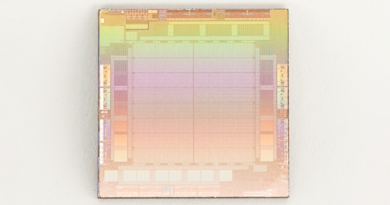Will Broadcom Be Worth More Than Apple by 2040? – The Motley Fool
Founded in 1993, The Motley Fool is a financial services company dedicated to making the world smarter, happier, and richer. The Motley Fool reaches millions of people every month through our premium investing solutions, free guidance and market analysis on Fool.com, top-rated podcasts, and non-profit The Motley Fool Foundation.
Founded in 1993, The Motley Fool is a financial services company dedicated to making the world smarter, happier, and richer. The Motley Fool reaches millions of people every month through our premium investing solutions, free guidance and market analysis on Fool.com, top-rated podcasts, and non-profit The Motley Fool Foundation.
You’re reading a free article with opinions that may differ from The Motley Fool’s Premium Investing Services. Become a Motley Fool member today to get instant access to our top analyst recommendations, in-depth research, investing resources, and more. Learn More
The diversified chipmaker is still expanding rapidly.
Broadcom‘s (AVGO -1.44%) stock has soared about 1,900% over the past 10 years. The chipmaker, which was known as Avago until it bought the original Broadcom in 2016, impressed investors with its robust growth and bold acquisitions.
With a market cap of $650 billion, Broadcom is now one of the most valuable chipmakers in the world. However, it’s still much smaller than its top customer, Apple (NASDAQ: AAPL), which has a market cap of $2.9 trillion. Let’s see if the growing chipmaker has a shot at overtaking its market-leading client by 2040.
Image source: Getty Images.
Before it bought Broadcom, Avago had already purchased a long list of smaller companies to expand its portfolio of wireless, optical, and data storage chips. By acquiring Broadcom, it gained more mobile, networking, wireless, and industrial chips.
Broadcom subsequently expanded into the infrastructure software market by acquiring CA Technologies in 2018, Symantec’s enterprise security division in 2019, and the cloud software giant VMware in late 2023. It expects its takeover of VMware to gradually reduce the weight of its semiconductor business, which accounted for 79% of its revenue in fiscal 2023 (ended October 2023), to roughly 50%. That acquisition will also reduce Broadcom’s dependence on Apple, which contributed 20% of the chipmaker’s revenue in the past two fiscal years through its purchases of wireless chips.
From fiscal 2016 to fiscal 2023, Broadcom’s adjusted revenue rose at a compound annual growth rate (CAGR) of 15%, its adjusted gross margin expanded from 60.5% to 74.7%, and its adjusted earnings per share (EPS) increased at a CAGR of 21%.
Analysts expect Broadcom’s revenue and adjusted EPS to grow 41% and 11%, respectively, in fiscal 2024 as it integrates VMware, it sells more AI-oriented chips, and the macro environment improves. In fiscal 2025, analysts forecast its revenue and adjusted EPS to rise 14% and 22%, respectively, as it fully laps its acquisition of VMware.
Yet Broadcom doesn’t look like a bargain right now at 30 times forward earnings. Its valuation was likely inflated by the bullish sentiment regarding its sales of AI chips, which quadrupled year over year to $2.3 billion (31% of its semiconductor revenue and 19% of its total revenue) in the first quarter of fiscal 2024. That helped to offset its slower sales of enterprise and telecom chips. It expects its AI chip sales to continue rising and account for 35% of its full-year semiconductor revenue.
That’s a bright outlook, but investors shouldn’t put Broadcom in the same category as Nvidia, which is growing significantly faster, generates most of its revenue from AI chips, and trades at just over 40 times forward earnings.
It’s impossible to tell what will happen to Broadcom over the next 16 years. It could “deworsify” its business with too many acquisitions, struggle to keep pace with its competitors, and lose major customers like Apple.
But assuming Broadcom trades at a more reasonable forward multiple of 20 and boosts its adjusted EPS at a steady CAGR of 15% from fiscal 2024 to fiscal 2040, its share price could rise to about $9,000. That would represent a six-bagger from its current price and boost its market cap to $4.2 trillion, which would make it worth more than Apple today.
But to reach the same market cap, Apple’s stock would only need to rally by less than 50% over the next 16 years. Apple might be in the middle of a cyclical slowdown right now, but it will likely expand its business with new hardware products, subscription-based services, investments, and big acquisitions over the following two decades. It should also continue to plow billions of dollars into its buybacks to boost its EPS. Therefore, I think Apple’s stock could still easily double or triple by 2040.
Broadcom probably won’t be worth more than Apple by 2040, but it could generate much bigger gains from today’s levels as it expands its semiconductor and software businesses. Nevertheless, investors should still keep a close eye on Broadcom’s expansion strategies to make sure it isn’t sacrificing its margins or taking on too much debt to grow its revenue.
Leo Sun has positions in Apple. The Motley Fool has positions in and recommends Apple and Nvidia. The Motley Fool recommends Broadcom. The Motley Fool has a disclosure policy.
Invest better with The Motley Fool. Get stock recommendations, portfolio guidance, and more from The Motley Fool’s premium services.
Making the world smarter, happier, and richer.
© 1995 – 2024 The Motley Fool. All rights reserved.
Market data powered by Xignite and Polygon.io.


